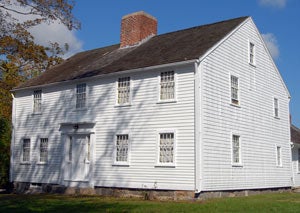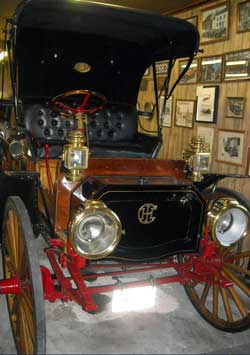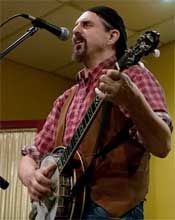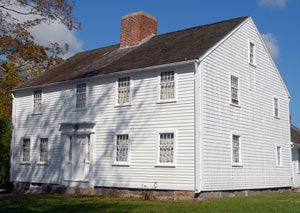 KINGSTON, R.I. — July 6, 2010 — If you like antique cars, authentic jonnycakes, weaving and spinning, history, food, vintage clothing, and fun, then plan to drive to the University of Rhode Island Sunday, July 25, rain or shine.
KINGSTON, R.I. — July 6, 2010 — If you like antique cars, authentic jonnycakes, weaving and spinning, history, food, vintage clothing, and fun, then plan to drive to the University of Rhode Island Sunday, July 25, rain or shine.
The Oliver Watson House Festival offers all that and much more. The festival runs from 10 a.m. to 3 p.m. While the event is free, donations will be accepted to fund preservation efforts of the historic Watson House, located in the midst of the University’s Kingston campus at One Farm House Road. Parking is free in the West Alumni Avenue and Flagg Road lots.
The farmhouse, the oldest building on campus, was built around 1796. In 1888, the state of Rhode Island purchased the 140-acre Watson farm for $5,000 to establish an agricultural school, which grew into the present day URI.
The house has functioned as a women’s dormitory, a fraternity house, a tearoom and nursery school operated by the former Department of Home Economics. When the nursery school was moved to its new site in the 1960s, the house stood idle and was threatened with a wrecking ball. The Watson House Committee, formed by retired URI President Emeritus Carl Woodward, saved the house. The committee exists today as a group dedicated community members who prize its history and are willing to dig into their own pockets to keep it standing.
“Today the house, with its six fireplaces, original mantles, and beehive oven, is a museum decorated and furnished in a rustic 18th century style,” says committee member Sandy Taylor of North Kingstown, retired University architect, who chairs the event. “Yet few people know about it. The festival is a perfect way to showcase the house by providing tours throughout the event. The festival is also a great way to raise funds for some needed costly preservation efforts, such as windows, which cost $1,200 to $1,500 each to restore. Donors who “purchase” a window will have their generosity memorialized on a small metal plate.
Taylor said that former URI President Robert L. Carothers, honorary chair of the event and Robert A. Weygand, URI vice president for Administration and Finance will speak during the day’s activities.
 Antique cars and jonnycakes
Antique cars and jonnycakes
Antique cars will be a centerpiece of the festival. Diane Smith of Wakefield and long-time Watson House Committee member is also an antique car enthusiast with her husband Bob. In fact, Bob Smith has restored six antique cars. The couple’s favorite is a 1916 Studebaker with an open top. The Smiths have enlisted various car clubs to participate. The show is open to all owners of classic and vintage vehicles, pre-1981. For vehicle or vendor registration, call 401.783.5483.
Rhode Island’s favorite cartoonist and 1973 URI alumnus Don Bousquet will choose the winner, based on which vehicle he would most like to own. Bousquet will present the car’s owner with a framed original cartoon.
In addition to their interest in antique cars, the Smiths own and operate Carpenter’s Grist Mill in Perryville. The couple purchased the 1703 mill in 1988 and began restorations. The mill, which grinds whitecap flint corn into cornmeal, was placed on the National Register of Historic Places in 1990.
Cornmeal is the prime ingredient in jonnycakes, a Rhode Island bragging right for the past 350 years. When Roger Williams arrived in the state, he discovered that the Native Americans grew flint corn. Soon it became one of the main food crops of the colonials as well.
The Smiths will use whitecap flint corn to cook jonnycakes at the festival. URI’s Carl Sawyer, research associate in the College of the Environment and Life Sciences, helps to preserve the strain with yearly plantings. This year, a sample crop of the corn was planted for the festival inside the white picket fence of the Watson House.
Craft demonstrations, silent auction, and music

Weavers, spinners, butter churners, candy makers, rug hookers and braiders will demonstrate their skills during the festival. Plants and herbs will also be displayed.
Musicians Mike Fischman of Newport and Doc Wood will perform. Fischman, recognized by many as the Friday evening DJ on WRIU’s Bluegrass Breakdown, is known for his work with the John Michaels Group; the folk duo Folk Support Group and Jimmytown Juke both with Ed McGuirl and plays rhythm guitar in a 17-piece swing band, Swinglane. Fischman plays many styles of folk music, Dixieland jazz, old timey, Irish, and bluegrass. His instruments include banjo, bass, guitar, mandolin, harmonica, and Dobro.
 Steve Wood of Wakefield, URI professor of communication studies and film media, plays folk music, a touch of bluegrass, traditional, old time, and a bit of the blues will also perform during the festival. In addition to guitar and bass, Wood plays the mandolin (including an octave mandolin, banjo—4, 5, and 6-strings models), the hammered dulcimer, and the Native American flute. He performs locally—sometimes solo, or with his friend Joe Miller (button accordion), or with the Cognitive Dissidents-a trio of URI faculty singing songs of social justice. During the summer, the professor and Jon Dember often play Saturday mornings at the Coastal Growers Market held at Casey Farm in North Kingstown.
Steve Wood of Wakefield, URI professor of communication studies and film media, plays folk music, a touch of bluegrass, traditional, old time, and a bit of the blues will also perform during the festival. In addition to guitar and bass, Wood plays the mandolin (including an octave mandolin, banjo—4, 5, and 6-strings models), the hammered dulcimer, and the Native American flute. He performs locally—sometimes solo, or with his friend Joe Miller (button accordion), or with the Cognitive Dissidents-a trio of URI faculty singing songs of social justice. During the summer, the professor and Jon Dember often play Saturday mornings at the Coastal Growers Market held at Casey Farm in North Kingstown.
Fashion “Dolls” exhibit
 Don’t forget to check out the The Building Blocks of Fashion exhibit in the display cases on the first and second floor of URI’s Robert L. Carothers Library and Learning Commons, 15 Lippitt Road, open from 1 p.m. to the end of the festival.
Don’t forget to check out the The Building Blocks of Fashion exhibit in the display cases on the first and second floor of URI’s Robert L. Carothers Library and Learning Commons, 15 Lippitt Road, open from 1 p.m. to the end of the festival.
The exhibit, curated by Joy Spanabel Emery, professor emerita of theater and former adjunct professor of textiles, fashion merchandising and design and Associate Professor Sarina Rodrigues Wyant, features fashion “dolls,” miniature clothing styles, promotional display boards and patterns of fashions from the 1920s through the 1960s.
Not designed as playthings, fashion ”dolls” were used as tools for clothing marketing, designing, training and creating excitement for home sewing fashion. Most of the items on exhibit are from the Elizabeth Brown Collection that was recently donated to URI’s Commercial Pattern Archive. Located in the library, the archive contains the largest pattern collection in the world.
Brown worked as a representative of McCall Pattern Company throughout the 1960s.
She took many of the pieces to department stores to demonstrate the fashions of the latest McCall’s patterns. The larger dolls were dubbed Minikins and were designed by Margit Nilsen, a leading manufacturer of store window mannequins and are circa 1939/1940. They were featured displays in the dry goods sections to show the pattern style and suggested fabrics.
Brown also collected from other pattern companies including Simplicity’s “Fashion Doll” which also on exhibit. Roberta Hale of Wickford created some of the reproduction doll clothing. The exhibit runs through August.

